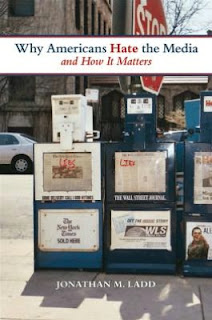 Ladd applied the “Page 99 Test” to his new book, Why Americans Hate the Media and How It Matters, and reported the following:
Ladd applied the “Page 99 Test” to his new book, Why Americans Hate the Media and How It Matters, and reported the following:With all the changes to the news media landscape over the past few years, it is hard to know how people learn information and form political preferences in this new environment. I argue that this media landscape has set up an important choice between using conventional media sources that try to adhere to the 20th century ideal of objectivity and newer sources that offer more sensationalist and/or partisan interpretations of the news. Given this dynamic, whether one trusts the mainstream media is now more important than ever, because it affects where one acquires new political information.Learn more about the book and author at Jonathan M. Ladd's website.
Consistent with this, even while mainstream sources hold smaller market share than they once did, people still hold very strong opinions about them. Questions about trust the mainstream media have very low refusal and “don’t know” rates compared to other poll questions. On page 99, I summarize the results of a survey I conducted in the mid-2000s, where, rather than using the a conventional closed-ended poll format, I allowed people to explain their opinions about the media in their own words and recorded their entire responses:
… [T]he two types of thoughts mentioned by far most frequently both relate to the trustworthiness of the information the media provide. These were thoughts about news accuracy, which were mentioned by 41% of respondents, and thoughts about general bias or too much opinion overall, which were mentioned by 22% of respondents. Every other type of comment was made by less than 10% of the sample.
For example, here are the comments of an independent who gave the news media a thermometer rating of 40 and was coded as mentioning accuracy: “You cannot believe everything you read. Sometimes the media stretches the truth and clouds some stories that you don’t know if it [is] true or not.” Here is another independent, who gave the media a thermometer rating of 60 and also mentioned accuracy: “I think they try to report as close to facts as they can. Sometimes I think in some cases they give too much info.” A Democratic- leaning independent, who had “only some” confidence in the press and was coded as mentioning accuracy, said, “The institution is manipulative, doesn’t always give the full story, uses information to benefit itself instead of the cause of others.” Another Democratic-leaning independent, who was coded as mentioning sensationalism, accuracy, and general bias even though he gave a thermometer rating of 70, said, “I think the news media tries to be fair and accurate, but those that control the purse strings are affected by what they perceive as what the public wants and what draws in an audience (what makes money)—sensationalism, hype and sound bites.” A weak Democrat who trusted the media “only some of the time” and was coded as mentioning both accuracy and general bias simply said, “I think that a lot of the media has their own biases that come through when they report the news—particularly in the area of politics.” Another weak Democrat who had “hardly any” confidence in the press and was coded as mentioning accuracy and Republican bias said, “The press has not written the truth since Bush has been in office. [Any others?] That they are afraid to speak against this administration.”
--Marshal Zeringue



